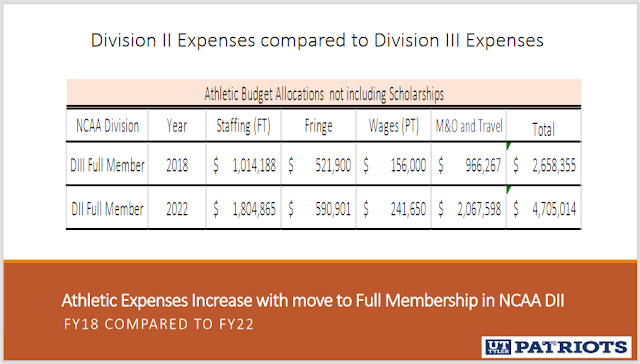UT-Tyler Students To Vote On Fee Increases Week Of Nov. 1
Hi guys! Here’s what you need to know about the upcoming fee vote next week.
The Student Government Association (SGA) at UT-Tyler will hold a special election starting on Nov. 1 over requests for fee hikes to two student fees, its website reports.
The election will begin Monday, Nov. 1 at midnight (12 a.m.) and end Friday, Nov. 5 at noon (12 p.m.). All registered students will be able to participate in the election via their Patriot Email.
The Two Proposals
The two fees with proposed increases are The Intercollegiate Athletics Fee and The Recreational Facility Fee.
The proposal for The Intercollegiate Athletics fee is to raise the maximum chargeable amount per student from $240 dollars per semester to $300 dollars per semester and the semester credit hour (SCH) rate from $16/SCH to $20/SCH. If approved, the fee increase will take effect in Spring 2022 at $18/SCH with a $270 dollar max and then in full in Fall 2022 at $20/SCH with $300 max.
The proposal for The Recreational Facility Fee is to raise the rate from $40 per semester to $70 per semester. If approved, the fee increase will take effect in Spring 2022 at $55 per semester and then in full in Fall 2022 at $70 per semester.
If approved, the increases will be mandatory for all students.
Why Do They Want To Raise The Fees?
The Athletics Fee
According to UT-Tyler Athletics Director Howard Patterson who spoke in a town hall meeting on Oct. 19, the athletics fee increase is necessary to fund multiple operational costs increases since the program joined Division II of NCAA athletics.
Patterson said that travel costs, recruiting costs, staff salary demands and medical insurance costs, among others, have increased as a result of the program going to DII.
Travel Costs
Patterson said UT-Tyler’s conference was unexpectedly expanded to include many more schools from across the region. As a result, travel costs have increased exponentially, he said.
“What’s created the biggest challenge for us in moving into Division II has been an expansion of the conference since we established out NCAA Division II provisional membership budget,” Patterson told the town hall.
“The Lone Star Conference” (UT-Tyler’s conference) is the largest geographical conference in the nation and includes over fifteen schools from Northern Oklahoma to Southern Texas and spreads out from Southeastern Arizona to Western Arkansas
Patterson said, “By increasing the number of schools in our conference, it’s increased our travel, it’s increased our lodging, it’s increased our food. It’s increased all of our expenses which we didn’t expect at the time.” Thus, travel costs have increased exponentially.
Recruiting Costs
Paterson also said recruiting costs have increased.
“Recruiting costs have gone up exponentially,” he said. UT-Tyler now not only competes for athletic talent against the numerous schools in its new conference but also competes with the lower level DI schools in the region.
“The Stephen F. Austins, The Sam Houston States, The Tarleton States…,” Patterson said, “We’re going after the same level or quality of player that they have.” Therefore, recruitment costs have also gone up.
Other Costs
Patterson also listed other factors that drive program costs such as necessary facility upgrades, higher demands on staff positions and staff salaries due to NCAA mandates and medical insurance costs among others.
See a full list of financial needs Patterson presented below.
Overall, Patterson reported that operating costs have doubled since UT-Tyler joined DII, from $2.66 million in DIII to $4.71 million in DII.
As for benefits of the athletics program, Patterson cited its contributions to school spirit and the promotion of the university’s brand, which he said aids higher student enrollment.
Both of Patterson’s town hall appearances, on Oct. 19 and Oct. 20 are available online on SGA’s YouTube page.
The Recreational Facilities Fee
According to Director of REC Sports and The Herrington Patriot Center (HPC) Rick McGill who spoke in a town hall on Oct. 19, his department seeks a student fee increase to enhance HPC operations, including equipment, programming and facility renovations.
According to McGill, the average lifespan of equipment is three to five years, but some HPC machine weights are roughly 15 years old. An increase in the student fee will help staff update HPC equipment to contemporary standards, he said.
"Updated equipment is by far and away our number one," McGill said in reference to the student responses the HPC receives on its annual feedback surveys.
A fee increase will also help the HPC extend its operating hours on weekends and add more outdoor adventure trips for students (destination trips for outdoor recreational activities), items McGill said students want based on an annual survey REC Sports conducts.
"All of these things are things we want to address with a facility fee increase and it's things we know that students want," he said, referring to the below slide.
As far as programming, McGill said his department wants to use the new money to add additional wellness programming and a replacement plan to ensure “equipment is replaced when needed.”
"We actually have the plan developed," he said. "We just don't actually have the funding for it."
In addition to equipment and programming, McGill said he would like to apply a fee increase towards facility renovations.
These include resurfacing the HPC pool, creating a family changing and gender-neutral locker room and renovating the front desk area, which he says will increase the usable square feet for the facility.
As for his operation’s benefits, McGill said HPC is open 90 hours a week, offers over 30 fitness classes each week and over 30 intramural sports each semester at no charge to students. He also listed other benefits.
The Director also said a campus recreation facility is important for student recruitment and retention.
The reader should know that the athletics program also makes use of the HPC, often to train and sometimes compete inside its facility.
McGill’s full presentation on Oct. 19 is available online on SGA’s YouTube page.
More information, including a FAQ is available on student government’s website.
What do you think about the fee proposals? Let me know in the comments below.
Enjoyed this post? Never miss out on future posts by following me.
Twitter: @jhescock12
Feature image "401(k) 2012" via Flickr






.jpg)
Comments
Post a Comment